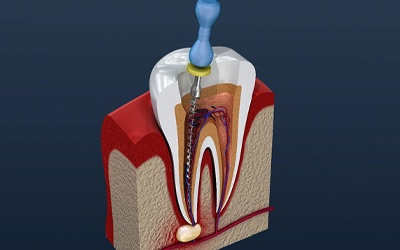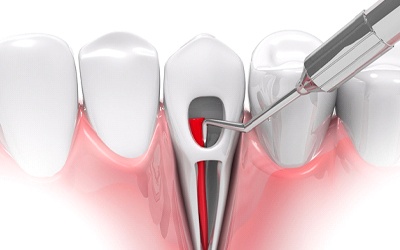
Root Canal Therapy
Stopping a Tooth Infection from Spreading
You might have heard that root canal therapy is an exceptionally painful procedure, but the truth is it’s a solution for pain. If you have a severe toothache caused by an infection, root canal therapy at DFW Absolute Dental can be the safest and most effective way to save your tooth and eliminate the discomfort. If there’s a pain in one of your pearly whites that hasn’t gone away after a couple of days, call us for an appointment right away.
Why Choose DFW Absolute Dental for Root Canal Therapy?
- Procedure Performed Entirely In-House
- Lifelike Crowns Provided for Restorations
- Various Kinds of Sedation Available
What is a Root Canal?

Root canal therapy is a procedure for removing infected pulp. The pulp is the inner layer of the tooth that contains various nerves and blood vessels. If you suffer from tooth decay, the bacteria may eventually reach the pulp and infect it, causing a toothache. Over time, the bone around the tooth might be damaged, and the tooth could be lost altogether. By performing root canal therapy, we can prevent any further damage; otherwise, the tooth could become so severely damage that an extraction is the only option.
Why Do I Need a Root Canal?

If you’re noticing signs of infection around one of your teeth, it cold be a sign that you need root canal therapy. These symptoms might include:
- A sore or pimple-like growth on your gums
- Discomfort whenever you chew or bite down
- Facial swelling accompanied by a fever
- Teeth becoming sensitive to hot or cold foods and drinks
Even if you’re not experiencing any pain, you could still need root canal therapy. Dr. Shahdad can thoroughly examine your mouth and take an X-ray to determine the source of your symptoms and decide whether root canal therapy is right for you.
The Root Canal Procedure

After we’ve decided to move forward with the therapy, we’ll use local anesthesia to numb the area around the tooth; we can also place a rubber dam so that the tooth stays free of saliva. We’ll create a small access hole to remove the pulp along with any bacteria or decayed nerve tissue. The inside of the tooth is then thoroughly cleaned and sealed. You’ll usually receive a dental crown afterwards.
Thanks to the anesthesia used during the procedure, root canal therapy is no more painful than receiving a filling. You might experience some discomfort afterwards (like you would with any surgery), but it’s nothing you can’t control with medication.
Post-Operative Care for Root Canal Surgery

We might prescribe some antibiotics to stop any infection from returning. We’ll also instruct you to take painkillers (either prescribed by us or purchased over the counter). Your tooth will be sensitive after the surgery, so avoid chewing with the side of your mouth with the surgical site; you’ll want to stick to eating soft, nutritious foods while you recover. You should start feeling much better after about a week.